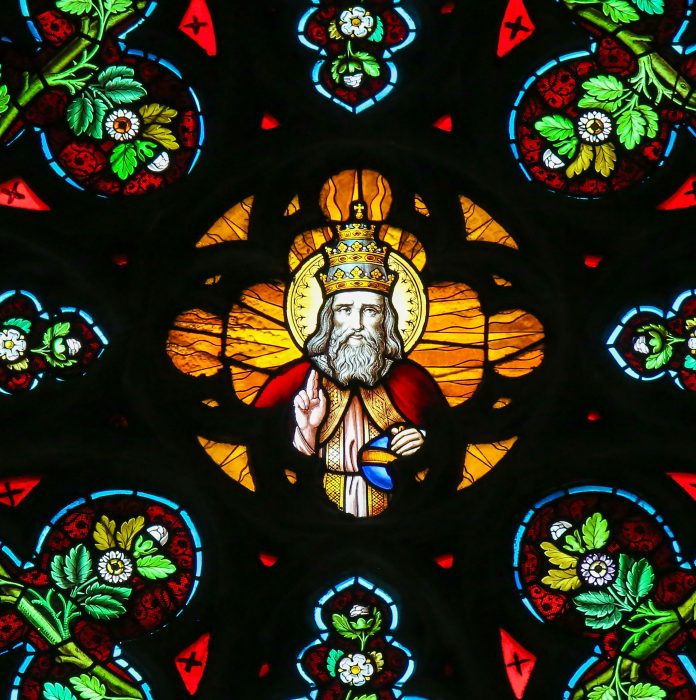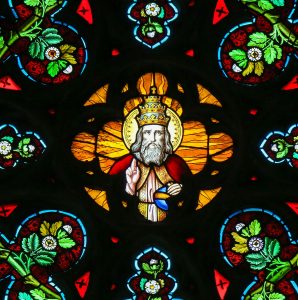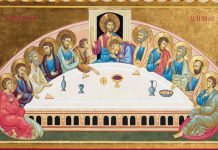
An Introduction to the Our Father and its First Petition
JAMES BLANKENSHIP
Editor’s note: This is the first in a series on the Lord’s prayer. Look for the rest on Tuesdays and Thursdays in Lent 2018.
“Lord, teach us to pray just as John taught his disciples.” — Luke 11:1
One of Jesus’ disciples asks the Lord to teach them to pray. In response, the Lord teaches us the perfect prayer that is “truly the summary of the whole gospel” (CCC, 2761). This perfect prayer is the Our Father. The Our Father is comprised of a salutation to God the Father and seven different petitions. Each part of the Our Father is rich in meaning and worthy of deep reflection. Let’s begin by looking at the very first phrase, “Our Father.” Then we’ll examine “hallowed be thy name.”
On both the natural and supernatural level, fatherhood is a state of being that is relational. A father is only a father in relation to a son or daughter. And a son or daughter is only a son or daughter in relation to the parents. The father passes on and shares with the son something from his very being. This truth is expressed by the common phrase, “like father, like son.” When you see a son, you see in a small way the father from whom he received his life.
By calling God Our Father, God invites us into his nature, which is Love. “For God is love” (1 John 4:8). St. Thérèse of Lisieux says:
“Love alone can make us pleasing to God, so I desire no other treasure. Jesus has chosen to show me the only way which leads to the Divine Furnace of love; it is the way of childlike self-surrender, the way of a child who sleeps, afraid of nothing in its father’s arms. “Whosoever is a little one, let him come unto Me” (Proverbs 9:4), says the Holy Spirit through the lips of Solomon, and the same Spirit of Love tells us also that “to him that is little, mercy is granted” (Wisdom 6:7).
Catechetical Application
The concept of fatherhood is often severely maligned by our society. Pop culture in the media tends to present an image of fatherhood that is weak and aloof. Contraception frustrates the very act of giving life. Abortion destroys the life that is communicated. Pornography mocks the dignity of human persons and destroys relationships. Divorce challenges and rends the bonds of love and unity of the family.
While all sin separates us from our heavenly Father, all is not lost. Yet we trust that all of the sadness and pain caused by sin can be healed through the love and mercy of God the Father. “Mercy is an indispensable dimension of love; it is as it were love’s second name” (St. John Paul II).
When we teach about the Our Father, we can use it as an opportunity to teach about the mercy of God. 
God as our Father can heal our pain, sufferings, and loneliness through our communion with Him. It is through these bold words — where we participate in life, love, and mercy — that we dare to say, “Our Father.”
First Petition: HALLOWED BE THY NAME
“God has highly exalted him and bestowed on him the name which is above every name.” — Philippians 2:9
There is something special about someone’s name. Give a child a doll and that doll quickly gets a name. Pets are given names. When a husband and wife find out they are pregnant, almost immediately they begin to think of names for their baby. If we understand how these names are important for us, how much more important is the name of God?
A name points to the very being of something or someone. For example, the name Eve is derived from the Hebrew word meaning “to live” and describes the very essence of who Eve is. Eve’s body was fashioned from Adam’s rib, and she is the mother of all the living.
“Beginning with this first petition to our Father, we are immersed in the innermost mystery of his Godhead” (CCC, 2807) by contemplating on the name of God. We petition God for the hallowness, or holiness, of his name, to be made manifest in us. In truth, we ask to become a participant in the holy grandeur of God’s divinity that is signified by his name. Let’s turn to the Prophet Isaiah (Isaiah 9:6) and meditate on three of the names that are attributed to God: Wonderful, Powerful, Father.
WONDERFUL
God is wonderful or “full of wonder.” The divine being is perfect and infinite Love (1 John 4:8). And when we begin to ponder that perfect love that is God, we cannot help but become full with wonder and awe. God’s love is amazing!
POWERFUL
In Latin one of the words for power is virtutae from which derives the English word virtue. God is powerful insofar as he acts according to his divine nature which is love. We reflect that divine name and power when we act virtuously in love.
FATHER
Father is a name that signifies a relationship with a child. By hallowing God’s name “Father” we ask to not only be called God’s children, but to be loved as his children. “See what love the Father has given us, that we should be called children of God; and so we are” (1 John 3:1).
Catechetical Application
I’ve heard it said by many priests that the most difficult mystery to preach about is the mystery of the Trinity, which is the mystery of God himself. How does one teach about this most sublime and infinite mystery? Teach about who God is by teaching about his name.
Questions for Discussion
■■ How does a name help us to understand who a person is? How does God’s name help us to understand who God is?
■■ What are the different names for God given to us in Scripture?
■■ Which name of God do you relate to most easily?
■■ When you ask to hallow God’s name, what are you asking for?
:::
[Editor’s Note: Here are the links to this seven part series: Part One is above.
Part Two is here. Part Three is here.]
:::
JAMES BLANKENSHIP is the director of religious education at St. Francis De Sales Church in Purcellville, Virginia. He is founder of the St. Isidore Project, dedicated to the poor by growing food and offering education and community.
PHOTO: JORISVO/SHUTTERSTOCK
This article was originally published in Catechist magazine, February, 2018




